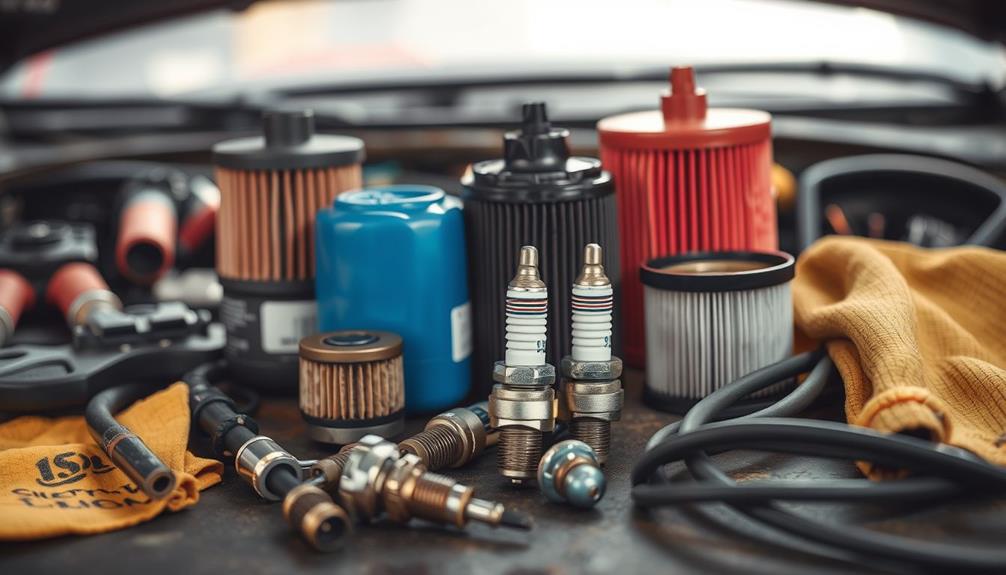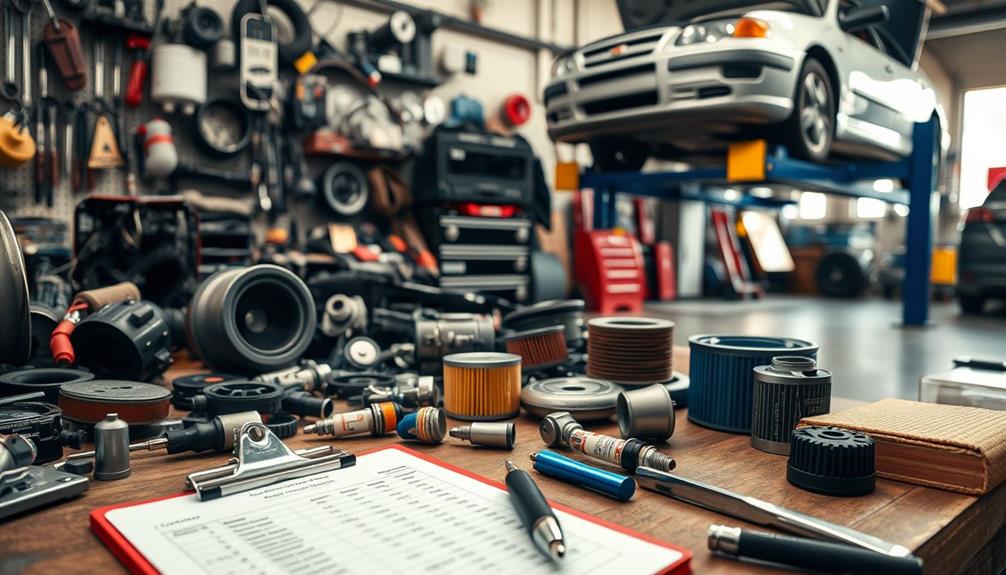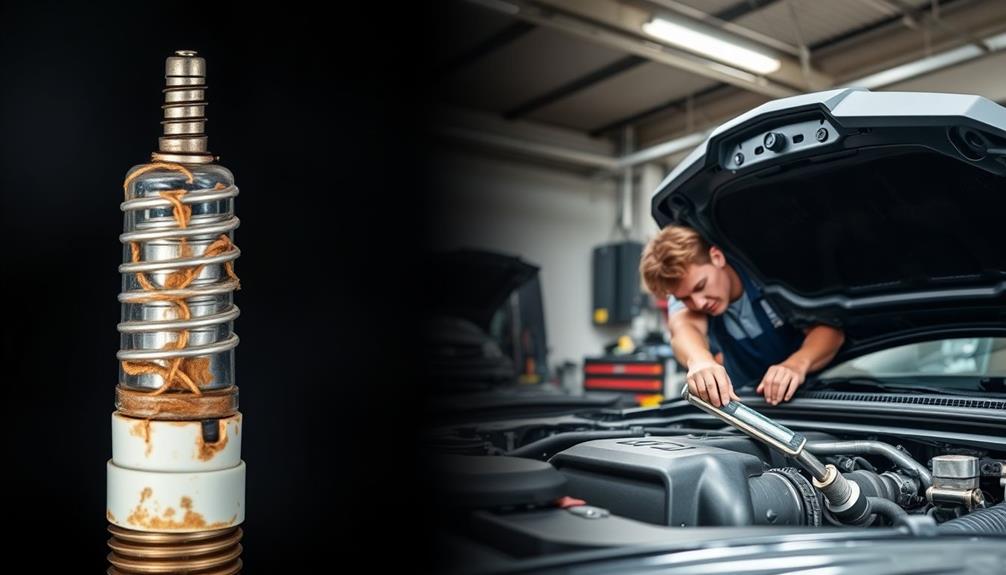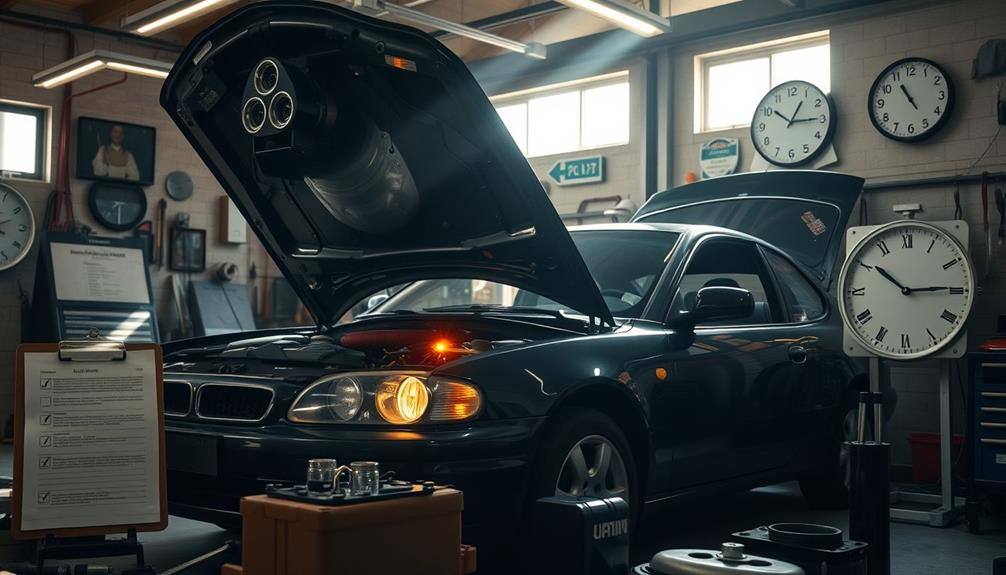Car tune-up costs can vary considerably depending on your vehicle and the services needed. A basic tune-up usually runs between $40 and $150, focusing on spark plug replacements and minor adjustments. For a more thorough service, expect to pay between $200 and $800, especially for older cars requiring additional parts and diagnostics. Factors like your car's make, model, labor rates in your area, and how well you've maintained your vehicle can all influence the final price. Understanding these elements can help you budget better, and there's more to discover about how to keep your car running smoothly.
Key Takeaways
- Basic tune-ups cost between $40 to $150, focusing on spark plugs and minor adjustments.
- Thorough tune-ups range from $200 to $800, including diagnostics and parts replacement.
- Older vehicles may incur costs up to $1,200 due to additional component needs.
- Vehicle make, model, and local labor rates significantly influence final costs.
- Regular maintenance can prevent expensive repairs and improve overall engine performance.
Cost Breakdown of Tune-Ups
When it comes to car tune-ups, understanding the cost breakdown can help you budget effectively. The cost of a tune-up typically ranges from $40 to $150 for basic services, mainly focusing on spark plugs replaced and minor adjustments. However, for more comprehensive tune-ups that involve additional services such as fuel filter replacement, air filter replacement, and a thorough inspection of the ignition system, the cost can range from $200 to $800. It’s important to factor in the cost of car tuning when considering regular maintenance for your vehicle, as neglecting tune-ups can lead to more costly repairs in the future. By understanding the breakdown of expenses, you can prioritize which services are most crucial for your car and allocate the necessary funds accordingly.
If you opt for thorough tune-ups, expect to pay between $200 and $800, which includes more extensive services like computer diagnostics and multiple parts replacement.
For older vehicles, especially those with 90,000 to 120,000 miles, the overall cost can reach up to $1,200 due to the increased number of components needing attention. Factors such as local labor rates, the vehicle's make and model, and the specific services included will impact your final bill.
Regular maintenance, including timely tune-ups, not only boosts engine performance but can also save you from more expensive repairs down the line.
Additionally, don't forget to take into account parts and labor when budgeting for your tune-up. Maintaining your maintenance schedule is essential, as it keeps your vehicle running smoothly and helps avoid costly future repairs, like air filter replacement or other significant issues.
Essential Components of Tune-Ups

Understanding the specific parts involved in a tune-up helps you make informed decisions about your vehicle's maintenance. A basic tune-up typically includes the replacement of spark plugs, which are vital for your ignition system and fuel economy. Depending on your vehicle, the cost of parts for spark plugs can range from $40 to $150.
If you drive an older car, you might need to replace the spark plugs every 12,000 miles or annually, while modern plugs can last up to 100,000 miles.
Comprehensive tune-ups may involve additional components like air filters, fuel filters, and PCV valves, adding to the total cost, which can range from $200 to $800. Regularly inspecting and replacing the air filter is critical for guaranteeing proper airflow to your engine; it's recommended to replace it annually or based on your driving conditions.
During a tune-up, mechanics often perform diagnostics tests to assess the condition of your ignition and emission systems, as well as fuel delivery. This guarantees that your vehicle runs efficiently and effectively, enhancing overall performance.
Factors Affecting Tune-Up Prices

Several factors influence the cost of a tune-up, and knowing them can help you budget effectively for your vehicle's maintenance.
First, the make and model of your car plays a significant role. Older vehicles with high mileage often require more extensive work, potentially raising costs to $1,200. The complexity of your engine and the specific services included—like spark plug replacement or air filter changes—also affect pricing.
Labor rates differ based on your geographic location, so you might find variations between service centers. Additionally, the price of parts can fluctuate, impacting the total cost of the tune-up.
If your vehicle has a history of regular maintenance, you might benefit from reduced costs because well-maintained cars usually require less extensive work.
Signs Your Car Needs a Tune-Up

Your car can give you clear signals when it needs a tune-up, and recognizing these signs can save you from more extensive repairs down the road.
Here are three key indicators to watch for:
- Check Engine Light: If this light illuminates on your dashboard, it's a critical warning that shouldn't be ignored. It might signal issues related to misfire codes or other engine problems.
- Fuel Efficiency: A significant decrease in fuel efficiency often means your car needs a tune-up. If you find yourself filling up more frequently, it could be time to check the spark plugs or air filter.
- Engine Performance: Frequent engine stalling, rough idling, or unusual noises like knocking can indicate underlying issues. These problems might stem from worn spark plugs, a faulty distributor cap, or the need for an air filter replacement.
Addressing these signs promptly can prevent costly repairs in the future.
Don't wait until your car's performance worsens; a timely tune-up can keep your vehicle running smoothly and efficiently.
Benefits of Regular Tune-Ups

Regular tune-ups offer a host of benefits that can greatly enhance your driving experience. By ensuring your vehicle receives regular tune-ups, you can optimize the performance of your engine, leading to improved fuel economy and a smoother ride.
This preventative maintenance helps identify any issues your car may need, such as filter replacement or spark plug replacement, before they escalate into costly repairs.
Regular tune-ups not only save you money in the long run but also contribute to a healthier environment. By reducing harmful emissions, you'll be in compliance with emissions regulations, making your car more eco-friendly.
Additionally, consistent maintenance can help your vehicle enjoy a longer lifespan, as it prevents wear and tear on critical components.
Ultimately, when you prioritize regular tune-ups, you're investing in your vehicle's efficiency and longevity. You'll experience better performance, lower fuel costs, and peace of mind knowing that your car is running at its best.
Frequently Asked Questions
What Is the Average Cost of a Full Tune-Up?
The average cost of a full tune-up ranges from $200 to $800, depending on your vehicle's make, model, and services needed. Basic tune-ups can start as low as $40 to $150 for essential checks.
What Is Usually Included in a Car Tune Up?
A car tune-up usually includes replacing spark plugs, air filters, and fuel filters, along with inspecting the ignition system. You'll often get an oil change too, ensuring your engine runs smoothly and efficiently.
How Much Does It Cost to Fully Tune a Car?
Think of your car as a garden; a full tune-up nurtures its health. You'll likely spend between $200 and $800, depending on the services needed and your vehicle's unique requirements. Keep it flourishing!
Is an Oil Change Included in a Tune-Up?
An oil change isn't typically included in a standard tune-up. However, some service providers may offer packages that combine both services at a discount, so it's worth checking with your mechanic about any available deals.
Conclusion
To summarize, understanding the costs of car tune-ups can help you maintain your vehicle's health, much like regular check-ups do for your body. By being aware of essential components, factors affecting prices, and the signs that indicate your car needs attention, you can make informed decisions that save you money in the long run. Embracing regular tune-ups not only enhances your car's performance but also extends its lifespan, keeping you safe on the road.









